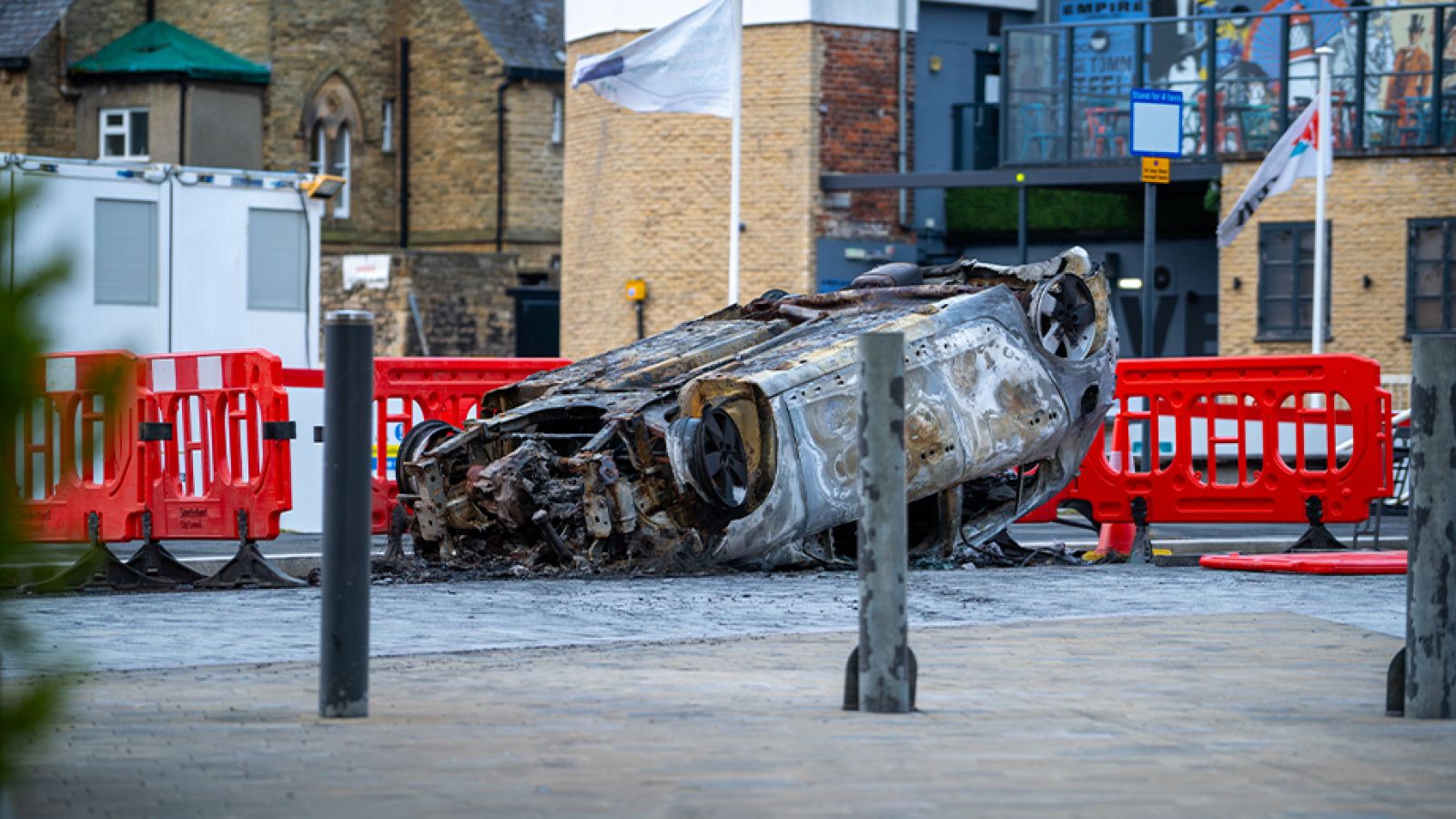What caused the UK race riots?

Aftermath of protests in Sunderland. Photo: Arty Inc/shutterstock.com
Article by Dr Simon Copland.
It is not an understatement to say that parts of the United Kingdom are collapsing.
Over the past fortnight, racist mobs have rioted across England. The events began after a 17 year-old boy committed a mass stabbing at a Taylor Swift dance class in the town of Southport, just north-west of Manchester and Liverpool. Three young girls were murdered, and 10 others injured.
In the aftermath of the stabbing, right-wing leaders such as Tommy Robinson and Andrew Tate spread baseless lies online, claiming the perpetrator of the attack was a migrant who arrived on a “small boat” and had been on a “MI6 watch list”. Because the attacker – since revealed to be Cardiff-born Axel Rudakubana – was initially unnamed due to an anonymity order, these rumours were able to spread quickly without correction.
Disorganised groups of racists took to the streets immediately. These riots have been blamed on the initial spread of both misinformation – led by a usual coterie of bad actors – social media and Elon Musk specifically – and disinformation pushed by Russian and Israeli actors.
Author and commentator Richard Seymour described the terrifying scene: “In Rotherham, they set fire to a hotel housing asylum seekers. In Middlesborough, they blocked roads and only let traffic through if the drivers were verified as ‘white’ and ‘English’, thus briefly enjoying the combined petty power of the traffic warden and the border official.
“In Tamworth, they rampaged through refugee accommodation and left, in the ruins, graffiti reading: ‘England’, ‘Fuck P*kis’ and ‘Get Out’. In Hull, as crowds dragged a man out of his car for a beating, participants shouted ‘kill them!’ In Belfast, where a hijabi was punched in the face while holding her baby, they destroyed Muslim shops and tried to march on the local mosque, chanting ‘get them out’. In Crosby, near Liverpool, a Muslim man was stabbed.
Disinformation certainly provided the spark that incited these events. But this cannot explain all of what is going on – to do so we must examine the deep, racist rot at the core of UK (and broader Western) society.
Nihilistic racism
In the UK, inequality is rising, poverty rates are increasing, and there is growing distrust in the political class. Polling also shows that significant numbers of Britons think their country is in a bad state and will get worse in the future.
These problems are doing something to the collective psyche that is leading to a small cohort being willing to adopt such violence.
It is not just that people are facing genuine issues, there is also a sense that they have lost their future. This is breeding a growing sentiment of nihilism, a crisis in faith, and belief that nothing is worth it anymore. Nihilism represents a loss of values, and in turn breeds a belief that nothing is worth it and all actions are meaningless. This nihilist sentiment is growing in prominence throughout Western society.
Many nihilists act in pure spite against those they believe are the cause of their problems. Smashing up shops, screaming racist slogans, and even stabbing people are actions that allow them to, as American political theorist Wendy Brown says, feel a sense of power “when world affirmation or world building are unavailable”.
Political power play
When faced with such despair, destruction becomes the only way out, particularly for a growing cohort of white men who are feeling left behind. As Brown says “if white men cannot rule the planet, there will be no planet”.
It is this nihilistic sentiment that racist leaders in the UK and around the world are capitalising on. Platformed by the UK’s mainstream media, leaders such as Tommy Robinson and Nigel Farage have consistently portrayed Muslims and migrants as threats to UK society and the cause of the pain so many people are feeling.
The two largest UK parties – the Tories and Labour – are no better when it comes to using migrants for political fodder. This ‘leadership’ has fundamentally influenced perceptions of immigration in the country, with a plurality of voters now believing that immigration has a negative impact on society.
This is the toxic combination at play that has sparked the violence of the current riots. Growing nihilistic sentiment is being capitalised upon by racist actors, who have turned it into a political weapon.
In the face of the increasing failures of the modern state to provide for regular people, political leaders are scapegoating migrants with increasingly violent outcomes.
Facing humiliation, defeat and failure, the men behind these riots are taking out their anger on migrants, both to create a sense of justice and to give themselves a feeling a power and control.
As Richard Seymour says, “the engorged excitement of these rioters, their enthralment at the spectre of catastrophe and annihilation, is in part an alternative to the pervasive effects of paralysis and depression borne of a dying civilization.”
This does not mean that this outcome is inevitable. Recent counter-protests have dwarfed the scale of the initial riots, with Britons coming out in a huge force of anti-racist solidarity.
These movements show that a more positive response to the current crises is possible. But to achieve this we cannot just counter the racist movements, we need to give people a real sense of hope once again, so that racist narratives no longer have the pull they currently do.
This article was originally published by the ANU Reporter, here.